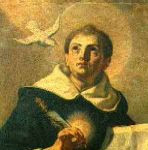Love One Another As I Have Loved You
Today's readings (Ex 12:1-8, 11-14, Ps 116:12-13, 15-16bc, 17-18 with the Antiphon from 1 Cor 10:16, 1 Cor 11:23-26, and Jn 13:1-15) are all about one important thing ... the Supper. Exodus points to the Passover meal that would be both the occasion of the Last Supper and its type, the Psalm calls the presidential prayers offered by Christ and priests ever since, the Epistle relates the actual story of the Institution. They are also intimately about the central figure in the readings: Christ and ever afterward his priests.
Now, I have not forgotten the Gospel. One might be tempted to think that is because it might appear that the Gospel is only tangentially about the Supper. The Supper itself is only mentioned briefly. But to that I say, on the contrary, it isn't about the Supper, it is the Supper.
In order to elucidate this, one must take a step back and think about John's Gospel in general. What can be said of it compared to the synoptics? In a sense, it is the one most concerned with Jesus the private individual, Jesus the private teacher, the one most concerned with Christ's Interior Life, whereas the synoptics are concerned with the public Christ. Where the other Gospels see Christ up into the mountain to pray and leave Him there, we are listening close to Him as he does in John. There is something else about John to keep in mind: he explains so much with very simple terms. Consider how words like Light, Bread, Water, Word, and so on are used in the Gospel narratives in John. John does not prepare a Doctoral Thesis like Paul's Epistle to the Romans. John's Gospel is eloquent, complete and satisfying precisely because it is so simple. He is also the Evangelist most concerned with showing more than telling. Think of how the Gospel begins ... with a hymn! But the rest of the Gospel shows how this hymn is true. It doesn't just say "look at the doctrine in this hymn to the Word. There it is, that's the doctrine." No, instead the whole Gospel shows us.
So now we return to the Gospel pericope for tonight and how it is intimately connected to the other readings. The synoptics usually focus on the Institution narratives because that is really their first crack at the Eucharistic significance of the event. But John already covered it by describing Christ's Bread of Life discourse in Chapter 6 (interestingly, that pericope is one that is in reverse. First, He showed people what the Eucharist was with the significant symbols of fish and bread, and only then did He tell them what it was after). So what happens in John is that he shows us what Christ did to demonstrate what the Supper was. Remember ... the showing not telling ... the simple language ... This is what the Supper is and does. It cleanses us who have already been cleansed by being admitted into the body. It is, in the words of the Pange Lingua, Christ giving His own body to his disciples with his very hands, and then calling on them to do this for each other, the community of believers. All of these things that we say about the Washing of the Feet: they are about service, they are about the institution of the Sacrament of Orders. All true, but ... that is only because this pericope is about the Supper itself. All our devotions flow from and back to this event. And this is why it was this Gospel, this act re-enacted in the Sanctuary tonight. Father washed the parishioners' feet, because Christ washes us in the Sacrament. We have priests now, specially set aside for this purpose, so that Christ can continue to give Himself with His very hands to us.
And that is the really message of the mandatum (Jn 13:34), why this is called Maundy Thursday. This is how Christ loved His disciples, by giving Himself so intimately and totally to them and for them.

No comments:
Post a Comment